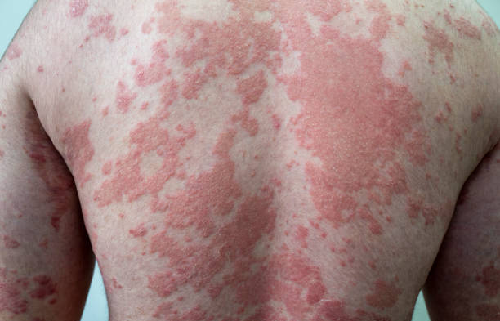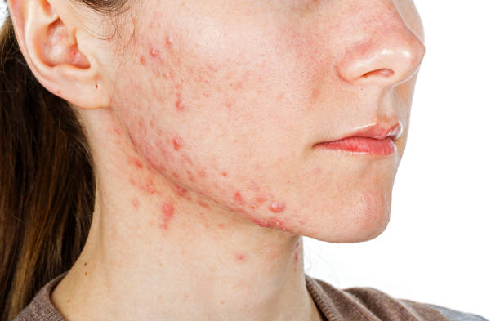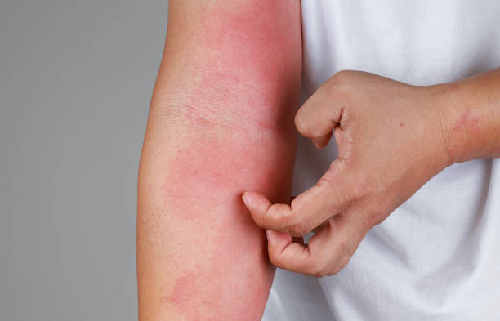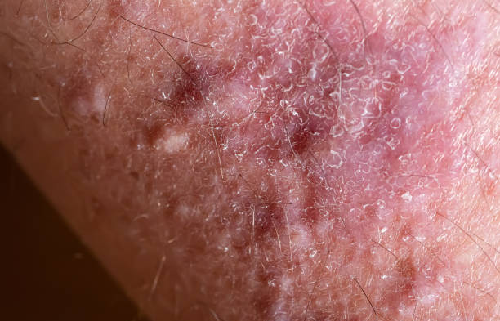Homoeopathy
Pinaakin Homeopathic Clinic, our aim is to provide personalized and holistic homeopathic treatment to address a wide range of health concerns. We focus on stimulating the body’s natural healing mechanisms through individualized care, gentle remedies, and comprehensive healthcare.
Homoeopathic Treatment for Skin conditions
Homeopathy offers a holistic approach; reduce inflammation, and promoting overall well-being alongside symptom relief. It is safe, natural, and has no side effects.
Homeopathy is based on the principle that treatment should focus on the patient as a whole, rather than just the ailment. Before an examination, patients answer a series of questions, to addresses emotional concerns.
Our homeopathic dermatologist provides treatments that go beyond physical symptoms, targeting underlying emotional factors like stress and despair that can contribute to skin disorders. This holistic approach not only treats the skin condition but also helps reintegrate the patient into society by improving their overall emotional well-being.
Your skin tells your story, Make it a beautiful one
Skin is the largest organ in our body; it defends the body from environmental dangers such as bacteria, toxins, and temperature. There are several skin concerns, some are temporary and harmless, and some are severe in nature. Skin conditions like vitiligo, psoriasis and eczema can be painful, long lasting and can impact your self confidence.
Skin is our body’s largest organ, serves as a crucial defence mechanism against environmental threats like bacteria, toxins, and temperature extremes. Various skin issues can arise, ranging from temporary and harmless to severe and chronic. Conditions such as vitiligo, psoriasis, and eczema can be particularly painful and persistent, significantly affecting one’s self-confidence.

Vitiligo

Eczema / Dermatitis

Psoriasis

Acne

Skin Allergy

Lichen planus

Bronchitis
Bronchitis inflames the bronchial tree, leading to chest congestion, coughing (dry or with mucus), vomiting/gagging, runny nose (before cough), body discomfort, chills, slight fever, chest pain, muscle/back pain, wheezing, and sore throat. It’s commonly categorized as Acute Bronchitis (lasting 7-10 days due to sudden infection) or Chronic Bronchitis (recurring).
Allergic Rhinitis
Hay fever, or allergic rhinitis, indeed shares symptoms with the common cold, but it’s caused by the immune system’s response to harmless substances like pollen. When someone with hay fever inhales these allergens, their immune system reacts excessively, triggering symptoms like nasal congestion, sneezing, runny nose, and itchy eyes. This reaction involves the release of chemicals like histamine, which inflame nasal passages, sinuses, and eyelids, leading to the typical symptoms of hay fever. Other symptoms may include cough, itchy throat, ears, or mouth, postnasal drip, and dark circles under the eyes. It’s a bothersome condition, but there are various treatments available to alleviate symptoms and improve quality of life during allergy seasons.
Asthma
Asthma is a chronic respiratory condition marked by airway inflammation and narrowing, leading to recurrent wheezing, breathlessness, chest tightness, and coughing. It affects people of all ages and can significantly impact quality of life if not managed properly.
Types of Asthma:
Allergic Asthma: Triggered by allergens like pollen, dust mites, pet dander, and mold.
Non-Allergic Asthma: Triggered by stress, exercise, cold air, smoke, strong odors, and respiratory infections.
Childhood-Onset Asthma: Begins in childhood due to genetic predisposition or allergen exposure. May persist or resolve over time.
Adult-Onset Asthma: Emerges later in life due to hormonal changes, occupational exposures, or environmental factors.

A food allergy occurs when the immune system reacts to certain proteins in food, causing symptoms such as hives, swelling, difficulty breathing, or anaphylaxis. Common food allergens include nuts, milk, eggs, wheat, and shellfish. Avoid triggering foods. Reading food labels and seeking medical guidance for diagnosis and management is essential for those with food allergies.

PCOD/PCOS
PCOD/PCOS is a hormonal disease in women which leads to irregular menstrual cycles. If one is to observe an ultrasound of the lower abdomen of a woman, one may be able to observe a series of abnormally large eggs, which looked like a string of pearls. PCOS may be caused due to a lot of reasons, including genetics.
Ovarian cyst
Ovarian cysts are fluid-filled sacs that develop in or on the ovary .They are common and can happen at any age. Some people with ovarian cysts have pain or pelvic pressure, while others have no symptoms. they usually involve pain or pressure in the lower abdomen on the side of the cyst. This pain may be dull or sharp; it may be constant or come and go.Types may include Dermoid cysts,chocolate cyst ,pcos etc
UTI
Urinary Tract Infection, is common in women, occur when bacteria enter the bladder via the urethra, causing infection. UTIs can affect various parts of the urinary tract: Urethritis, Cystitis, Pyelonephritis. Symptoms include:
• Frequent urination
• Urgency to urinate
• Nausea, fever
• Pain or burning during urination
• Cloudy, smelly, or bloody urine
• Lower back or abdominal discomfort
Menopausal issues
Menopause is permanent end of menstrual periods, ovulation and fertility. Menopause occurs because as women age, the ovaries stop producing estrogen and progesterone. During the years before menopause, production of estrogen and progesterone begins to fluctuate, and menstrual periods and ovulation occur less often. Eventually, menstrual periods and ovulation end permanently .Symptoms include hot flushes, anxiety, palpitations, osteoporosis etc
Endometriosis
Endometriosis is a condition where the tissue that normally lines the uterus (endometrium) grows outside the uterus. This tissue commonly appears in the peritoneum, ovaries, fallopian tubes, outer surfaces of the uterus, bladder, ureters, intestines, rectum, and the cul-de-sac (space behind the uterus).
The primary symptom is chronic pelvic pain, particularly before and during menstruation. Other symptoms include heavy menstrual bleeding. Many women with endometriosis have no symptoms and may only discover the condition when experiencing infertility issues.
Leucorrhoea
Leucorrhoea, or vaginal discharge, is common among females. While normal discharge is typical, problematic leucorrhoea can pose reproductive health risks if untreated, potentially causing infections and fallopian tube blockages that affect fertility. Symptoms include:
– Burning sensation in the vaginal area
– Vaginal itching
– Frothy, thick, white, or yellow discharge
If these symptoms occur, seeking medical advice is crucial to prevent complications and maintain reproductive health.
Fibroids
Uterine fibroids are common benign tumors of the uterus, made of muscle and fibrous tissue. Many women over 35 have fibroids without symptoms. They are the most common tumors in female reproductive organs.
Symptoms of Uterine Fibroids:
– Heavy, prolonged menstrual bleeding
– Painful periods
– Abdominal and lower back pain
– Bloating and swollen abdomen
– Frequent urination
– Constipation
– Pain during intercourse
During pregnancy, fibroids can cause complications like miscarriage, preterm birth, and postpartum haemorrhage.
Infertility
Infertility means not being able to get pregnant after one year of trying (or six months if a woman is 35 or older). Women who can get pregnant but are unable to stay pregnant may also be infertile. Most cases of female infertility are caused by problems with ovulation. Without ovulation, there are no eggs to be fertilized. Some signs that a woman is not ovulating normally include irregular or absent menstrual periods. The causes of fertility problems in women include:
• Blocked fallopian tubes due to pelvic inflammatory disease, endometriosis, or surgery for an ectopic pregnancy
• Physical problems with the uterus
• Uterine fibroids, which are non-cancerous clumps of tissue and muscle on the walls of the uterus.
PMS (Premenstrual syndrome)
PMS involves physical and emotional symptoms before periods, caused by hormonal changes. Symptoms usually subside after periods start. Severe PMS is known as Premenstrual Dysphoric Disorder (PMDD).
Emotional Symptoms:
– Irritability
– Mood swings
– Anxiety
– Depression
– Difficulty concentrating
– Sleep changes
– Loss of sex drive
Physical Symptoms:
– Bloating
– Breast swelling and tenderness
– Acne
– Fatigue
– Headaches
– Muscle and joint pain
– Backache
– Appetite changes
Most symptoms can be managed, but contact a healthcare provider if severe.
PID
Pelvic inflammatory disease (PID) is a polymicrobial infection of the upper female genital tract: the cervix, uterus, fallopian tubes, and ovaries; abscess may occur. PID may be caused by sexually transmitted infections. Common symptoms and signs include lower abdominal pain, irregular vaginal bleeding, cervical discharge, and cervical motion tenderness. Long-term complications may include infertility, chronic pelvic pain, and ectopic pregnancy. Pelvic inflammatory disease commonly causes lower abdominal pain, fever, cervical discharge, and abnormal uterine bleeding, particularly during or after menses.

Hyprtension
Hypertension, or high blood pressure, is a condition where blood exerts too much force against artery walls, often without symptoms. It can lead to serious health issues like heart disease, stroke, and kidney problems. Regular monitoring and treatment can manage it.
Thyroid
Thyroid disorders are conditions that affect the thyroid gland, a butterfly-shaped gland in the front of the neck. The thyroid has an important role in regulating numerous metabolic processes throughout the body. Different types of thyroid disorders affect either its structure or function. The function of the thyroid gland is regulated by a feedback mechanism involving the brain. There are specific kinds of thyroid disorders that include:
• Hypothyroidism
• Hyperthyroidism
• Goiter
• Thyroid nodules
• Thyroid cancer
Diabetes
Diabetes is a disease that affects your body’s ability to produce or use insulin. Insulin is a hormone. When your body turns the food you eat into energy (also called sugar or glucose), insulin is released to help transport this energy to the cells. Insulin acts as a “key.” Its chemical message tells the cell to open and receive glucose. If you produce little or no insulin, or are insulin resistant, too much sugar remains in your blood. Blood glucose levels are higher than normal for individuals with diabetes. There are two main types of diabetes:
• Type 1
• Type 2
Piles
Hemorrhoids, also known as piles, are swollen veins in the lower part of the anus and rectum. When the walls of these vessels stretch, they can become irritated. Older age, pregnancy, and constipation can cause piles. Symptoms of piles
• Bright red blood after passing stool
• An itchy anus
• A feeling like you still need to pass stool when you have been
• Slimy mucus
• Lumps around anus
• Pain around the anus
IBS
Irritable bowel syndrome (IBS) is a disorder that affects your lower GI (gastrointestinal) tract. This includes the small intestine and large intestine (colon). It is diagnosed when a person has belly pain or spasm associated with a change in the appearance or frequency of their bowel movements. It causes:
• Belly cramps
• Gas
• Swelling or bloating
• Changes in your bowel habits, such as diarrhea or constipation
Constipation
Constipation is when your stools are painful. Or they don’t happen often enough. It’s the most common GI (gastrointestinal) problem. Stool gets hard and dry when your colon (large intestine) absorbs (soaks up) too much water. your colon’s muscle movements are too slow. This makes the stool move through your colon too slowly.
You may have constipation if:
• You have bowel movements less than 3 times a week
• Your stool is hard, dry, and in small pieces

Rheumatoid arthritis
Rheumatoid arthritis is an auto-immune disease, meaning that the symptoms such as pain and inflammation are caused by the immune system attacking the joints. The important signs and symptoms to be aware of are:
• pain, swelling and possibly redness around your joints. Hands and feet are often affected first, though RA can start in any joint
• stiffness in your joints when you get up in the morning or after sitting for a while, which lasts for more than 30 minutes and has no other obvious cause
• fatigue that’s more than just normal tiredness
Osteoarthritis
Osteoarthritis, sometimes called “wear-and-tear arthritis,” is a common condition that many people develop as they age. It can occur in any joint in the body, but most often develops in weight-bearing joints, such as the hip. OA occurs when cartilage begins to break down from age or heavy use. Cartilage normally covers the ends of bones and allows them to move freely against each other. The degeneration of cartilage exposes the bones of the joint and allows bone on bone contact. This can cause:
• pain
• stiffness
• reduced range of motion
• changes in joint appearance
Crohn’s disease
Crohn’s disease is an inflammatory bowel disease causing chronic, patchy inflammation in the gastrointestinal tract. Symptoms include abdominal pain, anemia, and malnutrition. It results from genetic susceptibility, environmental factors, and altered gut microbiota, leading to dysregulated immune responses. Unlike ulcerative colitis, Crohn’s affects scattered areas of the intestine.
Migraine
Migraine is an episodic primary headache disorder. Symptoms typically last 4 to 72 hours and may be severe. Pain is often unilateral, throbbing, worse with exertion, and accompanied by symptoms such as nausea and sensitivity to light, sound, or odors.
Depression
Depression is a common mental health disorder characterized by persistent sadness, anxiety, or an “empty” mood. Symptoms include sleeping too much or too little, weight changes, loss of interest in activities, restlessness and irritability, unresponsive physical symptoms such as chronic pain, difficulty concentrating, fatigue, and feelings of guilt, hopelessness, or worthlessness.
Obsessive-compulsive disorder (OCD)
OCD is a disorder in which an individual have recurring, unwanted thoughts, ideas or sensations (obsessions) Having OCD means having obsessions, compulsions, or both. Examples of obsessive or compulsive behaviors include:
• Unwanted thoughts, impulses, or images that occur over and over and which cause anxiety or distress.
• Having to think about or say something over and over (for example, counting, or repeating words over and over silently or out loud)
• Having to do something over and over (for example, handwashing, placing things in a specific order, or checking the same things over and over, like whether a door is locked)
• Having to do something over and over according to certain rules that must be followed exactly in order to make an obsession go away. colon (large intestine) absorbs (soaks up) too much water. your colon’s muscle movements are too slow. This makes the stool move through your colon too slowly.
You may have constipation if:
• You have bowel movements less than 3 times a week
• Your stool is hard, dry, and in small pieces
Anxiety
Anxiety is a feeling of nervousness, unease, or worry in the absence of an imminent threat, unlike fear, which responds to immediate danger. Symptoms include feeling tense, dreading the worst, sensing time distortions, fearing others notice your anxiety, and constant worrying. It also involves seeking reassurance, fearing disconnection from reality, experiencing low mood and depression, ruminating on bad experiences, and feeling depersonalization or de-realization.
Schizophrenia
Schizophrenia is a serious mental illness characterized by incoherent or illogical thoughts, bizarre behavior and speech, and delusions or hallucinations, such as hearing voices Negative symptoms are capabilities that are “lost” from the person’s personality.
• Social withdrawal
• Extreme apathy (lack of interest or enthusiasm)
• Lack of drive or initiative
• Emotional flatness
